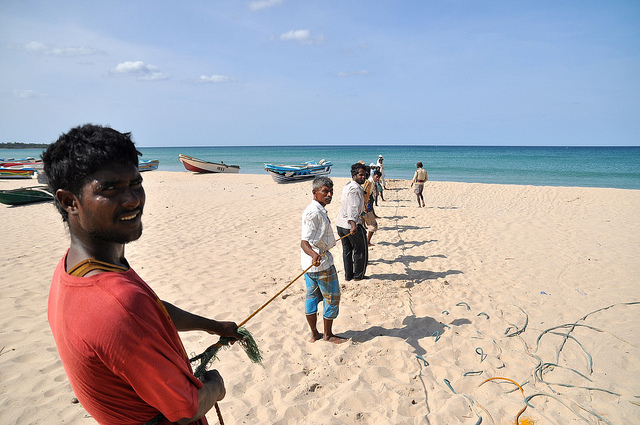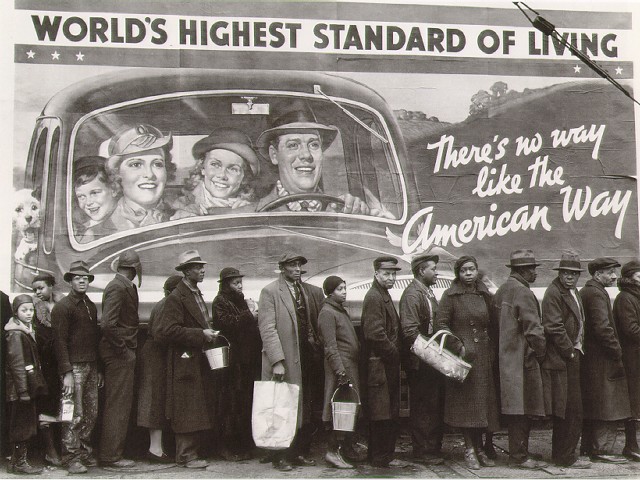Chip in to keep stories like these coming.
I spent the first two parts of this series with a bit of existential navel-gazing about food banks: should we close them down and give people money instead? Wouldn’t that be more efficient, and less paternalistic? So far, my answer is an emphatic maybe. On the one hand, people can make their own food choices with cash, and a complicated and intrusive bureaucracy would disappear. On the other hand, that same infrastructure allows us to turn small donations into large amounts of food assistance.
Cash rules everything around us
This post is part three of three, and that being so, it is time to reveal my bold answers to previously intractable problems.
It is wrongheaded to hold up cash transfers as the solution. Celebrating wealth because it gives us more choice and appears to increase our freedom has only ever worked for a few, at a great cost to many; and, ultimately, makes it more difficult to imagine new ways of living together and caring for each other.
Give a woman a fish, and she eats for a day. Teach a woman to fish, we are told, and she can feed herself forever. Give a man a can of tuna, and he eats for a day. Give a man some cash, and he decides.
I’ve so far been considering which is better, but why must these be the only options? What if her boat has a hole in it? What if her ancestors polluted and overfished all the rivers? Why are all these people fishing by themselves, for themselves? The questions we ask, and how we ask them, limits the range of possible answers and how we imagine alternatives–or not.

Charities make problems
At work we every day entrench and perpetuate a “parallel food system” that treats symptoms instead of causes, and that depends on massive donations of time and money from private citizens. We are, for many of the folks who use our service, a regular (and embarrassing) stop, somewhere between grocery store, bank, doctor’s office, and maybe the social assistance office, where staff will refer clients to us, knowing assistance rates cannot cover basic costs of living.
As a charitable organization we need to take responsibility for the ways we construct “problems,” and the ways we perpetuate our shared understandings of those problems and of the range of “solutions.” Whether explicitly or just by doing the work we do every day, we create understandings of charity and justice. Every day that we hand out food, instead of anything else, we endorse this system and we make it harder to imagine, or articulate, or work towards something different.
Long-term consequences from solving short term problems
So we continue to hand out food, and we continue to make it possible for staff at the Region to continue referring clients here instead of turning their (and our) gazes upwards and advocating for higher social assistance rates. We continue to hand out food, and it gets harder and harder to explain what is wrong with the massive corporate donations that, imperfect as they may be, come to us instead of to the landfill. Those well-intentioned donations, transport truck by transport truck, further entrench “voluntary, extra-governmental, charitable food assistance programs ” like ours, while inflation and political indifference wither social assistance rates.
I like to think — hope, perhaps — that by strenuously explaining our work in terms of a right to food, I might hear somewhat less regularly, from our patrons, that they are happy with anything because “beggars cannot be choosers.” The people we help are not beggars, even though they — our neighbours — must pass through us to gain access to the food they need to live.
We must also be part of challenging those understandings, which are sometimes quite incomplete; and despite the fact that we often have a vested interest in the status quo. I would not have a job if everyone in Kitchener-Waterloo was food secure. There’s a related point here: “Continuing to do what we are currently doing but doing it harder or smarter is not likely to produce very different outcomes. Real change starts with recognizing that we are part of the systems we seek to change.“
What’s wrong with choice
Yes, in a very straightforward way, money translates into choice, and more choice seems to translate into greater freedom. However, not all choices are equal, and more money does not necessarily improve, or even change the range of available choices. Poor people might know best, but they are still forced to choose from what is around them. If they are living in a food desert (or swamp) or have no good transit options or whatever, then the money is good, but not good enough. Others have made this point, eloquently, before:
Choice is a good thing; the notion that poor people must simply take whatever we feel like giving them is odious and wrong. However, a blind belief that “people always know best” ignores the reality that when you don’t have access to high-quality education, information, and products, it can be hard to make optimal decisions and take effective action. The poor don’t spend the cash on stupid things; they just may not have access to great things.

Didactic cartoon
We should take a step back and focus our energies on the structures that determine available choices, so that people have the opportunity to make real, good ones: is transit accessible and affordable? Can working people afford to live downtown? Who feels welcomed–and who is being squeezed out–by new condo developments? Why not a grocery store instead?
Charitable mutual aid?
Finally, Keenan’s articles were popular — many people have asked me about them, knowing where I work — because they were good articles, but also because I think that we want that solution. Excepting those who do not care one way or the other, don’t we want to believe that giving (money) is all that is required of us?
In this case, we give as much as we can without putting ourselves out, and in so doing satisfy our obligations to “the poor.” We need not interrogate why we have the money, why the standing relations of power privilege us and not them, or the various ways we every day benefit from oppressive systems. In other words, this kind of charitable giving turns a structural concern (call it capitalism without democracy, patriarchy, or all of the above and then some) into a question of individual arithmetic: how much can I afford to give?
So we have charities whose work is telling us which other charities to give our money to, charities that measure impact, that monitor and evaluate, that do pretty much everything but tell us that we are implicated in injustice — or ask us to dismantle those systems. I am simplifying here (I’ve talked more about this elsewhere), and my point is not to dissuade the donors who make our work possible. Rather, I think we can and should try to expand our ethical imagination to see that we cannot just write a cheque and carry on, business as usual — not when business as usual is basically the problem.
Food banking is just one of the clearest examples of government shifting responsibility for the provision of basic services to individuals, and their best charitable impulses. There should be room in every community for people to gift resources to others. Giving is a beautiful thing, but redistribution — so people have food to eat, or a place to sleep — should not depend entirely on charitable organizations, which depend, in turn, on benevolent donors.
Overdrawn at the bank
Benevolence is great, until it runs out. Maybe your benefactor runs out of money, maybe you accidentally offend them, or maybe you just get sick of doing whatever it is you need to do to keep them sweet. In a similar vein, some bosses are terrible and some are great, but ultimately we have labour laws so that it does not theoretically matter one way or the other. Likewise, everyone should have enough good food to eat, whether or not their neighbours want to share their surplus. This is a tangent I won’t follow very far here, but there is a substantive difference between communities where some depend on their neighbour’s charitable benevolence, and communities where people can look each other in the eye while they share and exchange resources for mutual benefit.

Source: shawnhunter.com
Martin Luther King Jr. said that “true compassion is more than flinging a coin to a beggar; it comes to see that an edifice which produces beggars needs restructuring.” King’s words are for all of us, not just those with the coins. They are a reminder that giving money does not alone change the status quo, and that we are all, whether we like it or not, part of systems that give some lots, many little, and leave nothing for the rest. This is an uncomfortable point, partly because none of us gets to choose where we are born, the colour of our parents skin, or any of the other seemingly arbitrary things that shape our lives so profoundly.
However, if our mission is to work towards healthier communities, and if we believe that the “social ills” we treat are not inevitable, but originate from preventable causes, then we have an obligation to make this point clearly and strategically.
Getting rid of all the food banks is not the answer, not today, though it is vital we keep talking about it. Like me, you probably care about value for money. Today, poverty is expensive — it costs most of us a lot. In the long run, justice is cheap: it’s not the eternal flinging of coins at the begging masses, but the reorganizing of communities so that everyone belongs, contributes, and has opportunity to thrive.
Chip in to keep stories like these coming.



